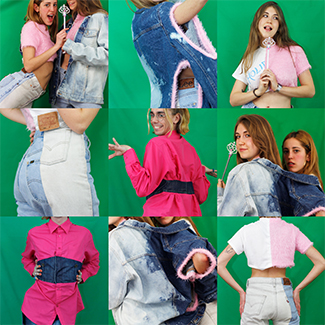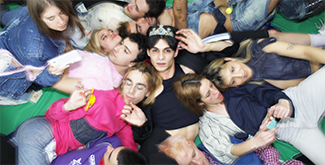consent_cookie
Duración: 1 year
Stores the user's cookie consent state
02-03-2021
Humana and Selena Winters (Finalist of the TVE talent show Maestros de la Costura 3) present an upcycling collection composed of garments based on a design that combines freshness, daring and fun. Always with a common denominator: sustainability and fashion creation from secondhand clothing.
With this collection, Humana winks at young Spanish designers and, within them, at those like Selena Winters who are committed to second-hand clothes as a basis for their creations. Starting from disused and seemingly low-value items, original and unique designs emerge, combining different fabrics, styles, textures and colors.
These are garments, at the same time, in which gender differences have no place, echoing one of the most fashionable fashion trends: genderless.
Selena herself describes the collection and the creative process developed during its making; “I've played a lot with denim, fusing several garments with each other and combining complementary colors; and, above all, reconstructions, in which risky openings play a leading role. I have almost completely dispensed with patterns, since I have focused on deconstructing garments, combining them, and building designs. As for colors, I also chose to deconstruct them, allocating some of the garments and flirting with the tie dye.
The clothes will be on sale from March 9 at the Humana store in 42, Toledo Street, in Madrid.
Second hand and sustainability are the present and the future of fashion
Beyond this capsule collection, Selena offers us her vision of fashion: “Second hand, upcycling, sustainability are the present and the future of fashion; clothes and accessories show who we are and how we feel. We can continue to do so, but for that we must rethink the model, consuming in a more responsible way. Creativity, originality, design… must coexist and be enriched within a fashion industry that is more respectful of our planet ”.
This vision fits perfectly with Humana's values: sustainable fashion approached from the perspective of the secondhand, leitmotif of the Foundation's network of outlets. As María Martínez, Marketing Manager of Humana Stores, recalls, “the fashion industry is the second most polluting on the planet, according to the UN, which is responsible for 8% of global emissions. It is intensive in raw materials and resources, as a result of a model based on overproduction and over-consumption. "
"In this scenario," continues Martínez, "second-hand fashion is a fully sustainable alternative. According to a study by Humana in which 700 customers from Madrid and Barcelona have participated, 60% say that when they buy a secondhand garment they stop buying a new garment. This implies a considerable saving in terms of resources and emissions. By giving a second life to clothing, we also reduce the volume of waste, promoting a circular model for fashion, in favor of the so-called close the loop.


